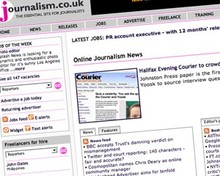
A reporter working for Journalism.co.uk set out to find private information on social networks about someone under the age of 16, where someone else could be found and details about an employee working for a specific company. It took him 10 minutes.
Social networkers may assume that profiles and on-site messages containing sensitive information are private; however, Journalism.co.uk was able to access their content quickly, easily and legally using search engine tactics.
Despite the ease of access to information of this kind, there remains a grey area around the extent to which newspapers can plunder these sites for information, as no hard guidelines yet exist about the rights to privacy people can expect. We are concerned that techniques similar to those we describe in our latest 'how to' can be used even more easily to target specific groups and people in specific locations to obtain private information.
Our letter also asks if, after publication next week of the results of its investigation into social networking sites, the PCC will consider issuing guidelines to newspaper journalists about the use of this information.
Because it is important for the main stakeholders in this debate to be aware how easy it is to obtain personal information so steps can be taken to help users protect themselves, Journalism.co.uk has also written to the Information Commissioner's Office (ICO) to make it aware how these techniques make it much easier to obtain personal information than by using the search facilities of the networks themselves.
But this might not just be a matter of training journalists about what is acceptable and understanding the shifting idea of what 'privacy' means in the context of online publication.
There may also be a need to educate the public that, if they make personal information available online, they may attract more interest than they were initially expecting and, even if they take deliberate steps to make their content private, it may still be legally accessible.
Individual newsgathering organisations are already ahead of the Commission. The BBC has issued its own guidelines to staff about dealing with information found on social networks.
The advice offered by the BBC to its reporters states that, even if material has been put into the public domain, it does not necessarily give the media the right to use it, primarily because the BBC would bring significantly greater public attention than would normally be expected.
The BBC guidelines state that consideration of the original context and the impact of re-use to those who may be grieving or distressed must also be applied by reporters prior to using information from social sites.
Journalism.co.uk has asked the PCC to consider issuing guidelines of its own.
All responses will be published here.
Free daily newsletter
If you like our news and feature articles, you can sign up to receive our free daily (Mon-Fri) email newsletter (mobile friendly).
Related articles
- Five key takeaways from the UK select committee on the future of news
- How Reuters, Newsquest and BBC experiment with generative AI
- Standing out in a crowded market: what makes a top news podcast?
- Fact-based journalism is under attack. What can we do about it?
- 15 online communities for journalists you should know about









